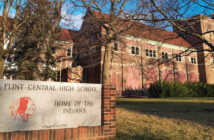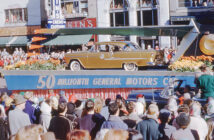
A tranquil green bower located in the heart of the city, Applewood is a gathering place where visitors can find community activities, gardening advice and inspiration, and peace. For those captivated by the aura of antiquity that hovers over the grounds, a visit to the estate is rendered even more engrossing by a history of this beloved Flint landmark.
In 1915, in a bygone era when cars were still referred to as motorcars, Charles Stewart Mott purchased 65 acres of farmland from two other Flint notables in order to establish a self-sufficient gentleman’s farm. Although the very idea of a gentleman’s farm is a fossil in our 21st-century lexicons, the desire for self-sufficiency registers as surprisingly modern. Mott hired his brother-in-law, architect Herbert Davis, to design Applewood’s buildings. The original plans for the estate included the main house, a gatehouse, a barn and a chicken coop, all of which are brick structures with slate roofs and copper gutters, and all are still present on the property. He also asked well-known landscape-architect William Pitkin Jr., another relative, to design the grounds, which were extensively cultivated. Every plant was carefully selected for the vegetable gardens, cutting gardens, perennial gardens, and rose gardens respectively. Even the trees were placed thoughtfully, so their blossoms and foliage could be enjoyed throughout the seasons. In fact, three trees on the property today preceded Applewood’s construction, and were present in the 1915 survey taken of the grounds, including an enormous cottonwood tree 16 feet in diameter.
Applewood was a working farm from its inception until 1949, and Mott was proud of the food produced there. In fact, he was so adamant that food consumed at Applewood be produced on-site that the family ate home-raised goose on Thanksgiving instead of traditional turkey. The floodplain of Gilky Creek was used as pastureland for Mott’s Holstein-Friesian cows, which provided meat, milk, butter and cream for the Applewood table. Chickens, geese, pigs and pigeons filled the barn and coop, while corn, potatoes, and hay were grown on a large scale to feed the animals. The barn itself was equipped with hot and cold running water, electricity and hay chutes: luxurious innovations that made day-to-day operations easier and more efficient. Arthur Hatherly, Applewood’s farm manager for over 30 years, was integral in running the farm, and he lived in the gatehouse with his family until he passed away at the age of 83.
Other features of the estate are evidence that there was plenty of play accompanying the Mott’s hard work, including a bowling green, a clay tennis court, a swimming pool, a game lawn, a putting green and riding trails. Both C.S. and Ruth Mott were tennis enthusiasts, and it was over a match of tennis that Frank Manley pitched to Mott the idea of after-school programs, which became a model for community education around the nation.
In 1952, Mott donated Applewood’s pastureland as the site for Mott Community College, the work horses and farm animals having been sold three years prior. The head gardener having also retired, the grounds at Applewood fell into disrepair as the Motts focused on their civic involvement and philanthropy. In 1973, upon C.S. Mott’s passing, Ruth Mott was left with a decision to make about Applewood. In 1977, she hired Johnson, Johnson & Roy landscape architects to renovate and re-establish the estate’s beauty, with the intent to eventually open it to the public. Mrs. Mott said that the restoration would “help to foster an interest in history, as well as preserving a gracious way of living and perpetuating the memory of Mr. Mott.” This work continued from that time, and still continues today, as Applewood caretakers honor the memory of its owners and welcome Flint residents to enjoy the horticultural beauty unique to this special place.
From apples and art to fireflies and zucchini, Applewood’s calendar of free public programs is loaded with creative activities, many designed especially for kids. Parking and all the events are free. Reservations are not necessary. Visitors are encouraged to bring a food or personal care item to donate, all of which are given to local shelters.
PHOTOS BY NAARAH MYERS
Are you interested in purchasing photos from this story? Go HERE and select the “Applewood” category.







